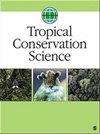落入权势之手:在尼加拉瓜Matiguás-Río Blanco的环境服务付款项目中通过挖掘证据来获取“成功”
IF 1.6
4区 环境科学与生态学
Q2 BIODIVERSITY CONSERVATION
引用次数: 4
摘要
支付环境服务费的前提是提供金钱奖励,以诱导被认为有利于促进热带保护的土地使用做法。Pagiola等人最近在该杂志上发表的一篇文章声称,PES通过植树造林成功地将尼加拉瓜Matiguás-Río Blanco的土地利用从农业用途转变为森林放牧,从而改善了碳封存和生物多样性保护。基于十多年来该地区农民和当地组织的不同观点,我们说明了为什么忽视相关行为者的平行声音来看待诸如支付提供和采用土地使用结果等关系不仅在分析上不准确,而且如果使用这种脱离背景的联系来显示正在推进热带保护的证据,则有可能是反生态的。我们认为,支付的影响必须与以下背景相结合:a)日益全球化和扩大的商品边界,PES计划实际上可能进一步推进,损害热带保护;b)在确定因果关系的方法方法中所做的假设。总之,我们强调了不加批判地描绘“成功”叙事的危险,以扩大投资,进一步扩散可能无法确保长期成果的非情境保护项目。我们建议通过更加开放、横向和长期的参与来应对这些潜在的危险,就热带保护干预措施成功的标准和后果与生活直接受其影响的行动者进行接触。本文章由计算机程序翻译,如有差异,请以英文原文为准。
Playing Into the Hands of the Powerful: Extracting “Success” by Mining for Evidence in a Payments for Environmental Services Project in Matiguás-Río Blanco, Nicaragua
Payments for Environmental Services (PES) are premised upon the provision of monetary incentives to induce land-use practices viewed to be beneficial for advancing tropical conservation. A recent article published by Pagiola et al. in this journal claims that PES successfully transitioned land-use from agricultural use in Matiguás-Río Blanco, Nicaragua to silvopastoralism through afforestation and hence associated improvements in carbon sequestration and biodiversity conservation. Building on contrasting perspectives from peasants and local organizations in the region for more than a decade, we illustrate why viewing relations like payment provision and adoption of land-use outcomes that disregard parallel voices of implicated actors is not only analytically imprecise, but risks being anti-ecological if such a decontextualized connection is used to show evidence that tropical conservation is being advanced. We argue that the effect of payments must be contextualized with: a) increasingly globalized and expanding commodity frontiers for which PES programs may actually further advance to the detriment of tropical conservation; and b) the assumptions made in the methodological approaches adopted to determine causality. In sum, we highlight the dangers of uncritically portraying narratives of “success” to scale up investment to further proliferate decontextualized conservation projects that may not ensure long-term outcomes. We propose responding to these potential dangers through more open, horizontal, and long-term engagement on both the criteria and the consequences of defining success in tropical conservation interventions with actors whose lives are directly affected by them.
求助全文
通过发布文献求助,成功后即可免费获取论文全文。
去求助
来源期刊

Tropical Conservation Science
BIODIVERSITY CONSERVATION-
CiteScore
3.60
自引率
5.90%
发文量
16
审稿时长
>12 weeks
期刊介绍:
Tropical Conservation Science is a peer-reviewed, open access journal that publishes original research papers and state-of-the-art reviews of broad interest to the field of conservation of tropical forests and of other tropical ecosystems.
 求助内容:
求助内容: 应助结果提醒方式:
应助结果提醒方式:


